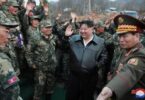BEIRUT (Agencies): Jumanah Zabaneh was at home when hundreds of Hezbollah and Amal supporters gathered in her Beirut neighbourhood. The crowd was there to protest against the judge leading an investigation into last year’s deadly explosion at the Lebanese capital’s port.
Her two daughters, aged eight and six, were already at school a few blocks away from the protests at the Beirut Justice Palace, while her husband, Adnan, was also nearby at work in Tayyoune. Zabaneh had earlier walked her children to school, as she always did. It was just 15 minutes away by foot. She was worried that the protests would be tense, but never expected what would follow.
Unidentified snipers started firing at the protesters. Gunmen arrived to fire back, resulting in hours-long clashes that killed at least seven combatants and civilians and wounded more than 30 others. “I saw the bullets from my window, and panicked,” Zabaneh told Al Jazeera, her voice still trembling. “I immediately called Adnan and said we have to get the kids from school and evacuate the area.” Her husband was in the middle of where the clashes were taking place. Dozens of men fired aimlessly with assault rifles, some firing rocket-propelled grenades (RPGs) that rattled the area. He walked carefully with his head down, snaking through side streets to not get caught in the crossfire.
“I just wore my slippers and ran to the school,” Zabaneh said. “Other parents trying to get their kids were stuck in traffic – so I volunteered to pick their kids up and host them safely at my place.” At the school, children were hiding under their desks or in basements. Some sat motionless and confused, while others panicked and cried. Adnan and Jumanah grabbed the children and ran back home, doing their best to avoid bullets and trying to ignore the sound of RPG rounds.
“The kids kept asking us about what was happening, but there was no story we could tell them,” Jumanah said. They managed to safely reach home and sit in a small corridor to stay away from glass windows, just in case the fighting got close to them. For Jumanah, it all brought back memories of the dark days of Lebanese civil war from 1975 until 1990.
“This experience is basically what we went through back then.” Lebanon’s troubled history is littered with conflict and distress, which never really ended after its 15-year civil war. The country witnessed a series of violent political assassinations in 2005, followed by a brutal six-week war with Israel in 2006. In 2008, seven days of nationwide clashes between Hezbollah and allies versus their pro-West political opponents closely resembled the warfare between factions in the civil war.
Reem Madi and her husband, Haitham Dinnawi, were working from home in Adlieh, right near where protests took place. Even after hearing the first few gunshots, Haitham kept preparing a late breakfast, while Reem continued to work. “We were startled, but we were expecting that kind of thing to happen [at the protest],” Madi told Al Jazeera. The couple say they have been struggling with what has been a distressing two years for Lebanon.
The Lebanese pound has lost 90 percent of its value, as three-quarters of the country’s population plunged into poverty. Hundreds of thousands of families are struggling to cope with alarming price hikes, medicine shortages and an electricity crisis – all the while being locked out of their life savings. And in August 2020, the explosion at Beirut’s port killed more than 200, wounded 6,500 others and flattened several neighbourhoods in the Lebanese capital. As the gunfire intensified, Madi turned up the volume on her headphones to drown out the sound. But by the time one of the gunmen fired an RPG round, the building shook and everyone paused. For Madi and Dinnawi, it was an all too familiar feeling.
“We knew it wasn’t an explosion, but it was like my body remembers the shaking after [the] August 4 explosion,” Madi said. “I held Haitham’s hand and we ran to another room to hide under the table.” Madi and Dinnawi fled Beirut with two friends who lived nearby, as soon as they were able to run to their car. “We had to leave because we were scared of armed people breaking into our homes or fire from our rooftops or whatever,” their friend Paul, who declined to share his last name, told Al Jazeera. “We haven’t had the chance to process the trauma from COVID-19, the economic crisis, the Beirut blast. And now you have this.”
On Friday, a tense calm prevailed in the area where the violence occurred. The army has cordoned off much of the area, with bloodstains on the asphalt, dozens of cars pulverised and buildings scarred with bullet holes. But the trauma from this experience lingers. Zabaneh now worries for her young daughters, who in just over a year experienced both the horrific port explosion and armed clashes. Concerned, she said she was running out of ways to comfort them. “My eight-year-old daughter has been improving with therapy to move on from the Beirut blast, but now we’re back to square one,” Zabaneh said. “She told me she wanted to sleep in my bed tonight.”






